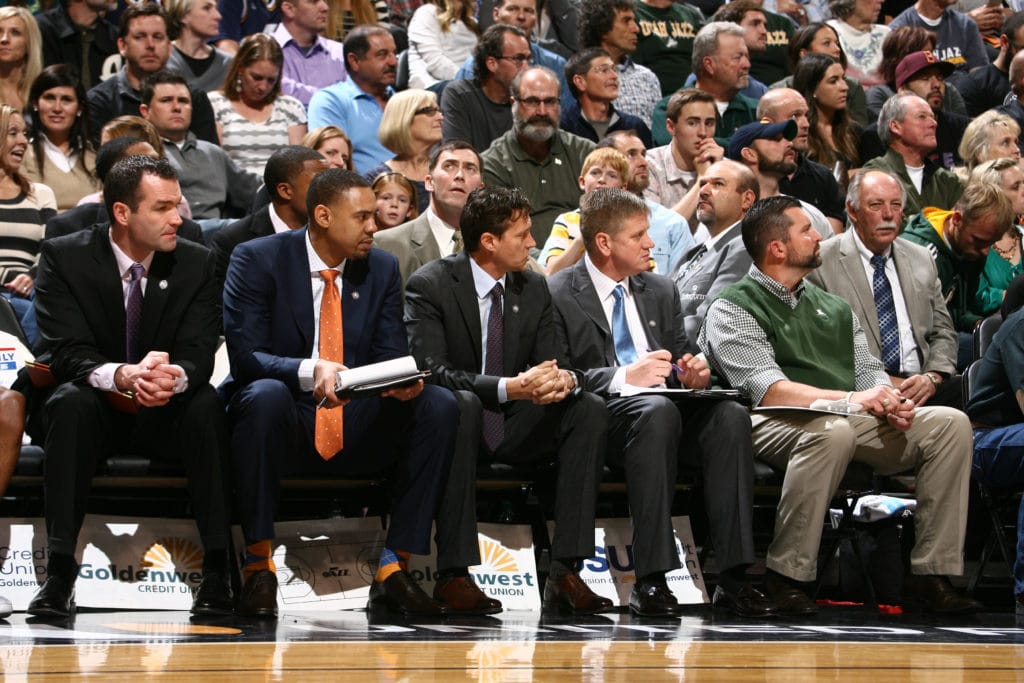
When it comes to coaching basketball, it is all about being a part of a team and contributing at your role. The same goes with assistant coaches and being able to add value to the team and to their head coach. This basketball coaching article will show you how to be a great assistant basketball coach, and will provide you with the know how to master this role.
Characteristics of a Loyal Assistant Basketball Coach
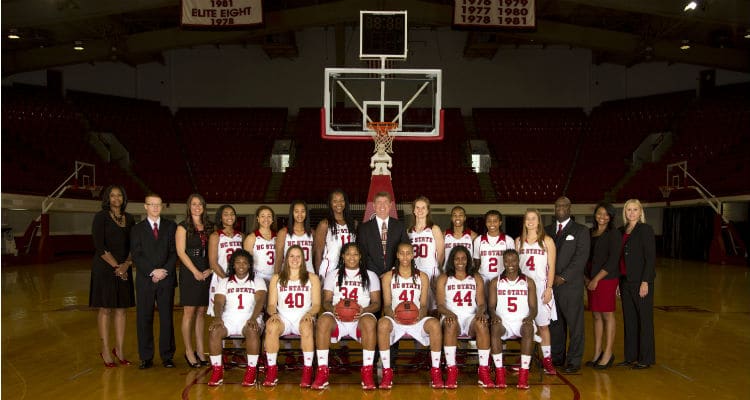
Mike Murray Contributed to this portion of the article.
Basketball Coaching Role
Working for Wes Moore for the past seven years, alongside Nikki West, who has worked for him for the past ten years, I have come to appreciate the value of loyalty and its impact on a basketball program’s success. Loyalty plays a major role in our profession.
Assistant coaches need to understand that it is the head coach’s basketball program, and they are there to help the head coach succeed. You need to support the head coach in all decisions and help them fulfill their team’s vision. Everything you do as an assistant basketball coach is to help the head coach and the program succeed.
Basketball Team Culture
Establishing a culture is vital to the success of a basketball program. Clear team policies and values that will not be compromised need to be set by the head coach and enforced by you every day. Make these policies and values part of who you are, not just things you hold the players accountable for.
People will come to you and ask a question regarding the day-to-day operations of the basketball team. Support the head coach and give the appropriate answer regarding team policies. By supporting the head coach’s values, you will show loyalty to the program. Be an extension of the head coach every day in everything you do.
Anticipate the Needs of the Head Coach
When you have worked for somebody for a while, you get an understanding of what things the head coach does not like to do. You will know right away what these things are, and you need to make sure these things get done by you first.
Try to anticipate the needs of your head coach; do not wait to be asked to do something. The more you take off the head coach’s desk, the more faith and trust you build and the more valuable responsibility you have.
Constructive Input
Do not be a “yes man” all the time. As you work longer for somebody, you may get more comfortable expressing your opinions and ideas. Have an opinion, make your point, but never argue it. Be able to recognize the difference between making your point, supporting your point, and arguing your point.
If you are fortunate to work for a head basketball coach that values your opinion and a professional debate, be extremely careful not to walk over that line by interjecting the emotion of arguing into the mix. Arguing leads to conflict and eliminates trust.
“The game is my life. It demands loyalty and responsibility, and it gives me back fulfillment and peace.” — Michael Jordan
Improving and Adding Value as a Basketball Coach
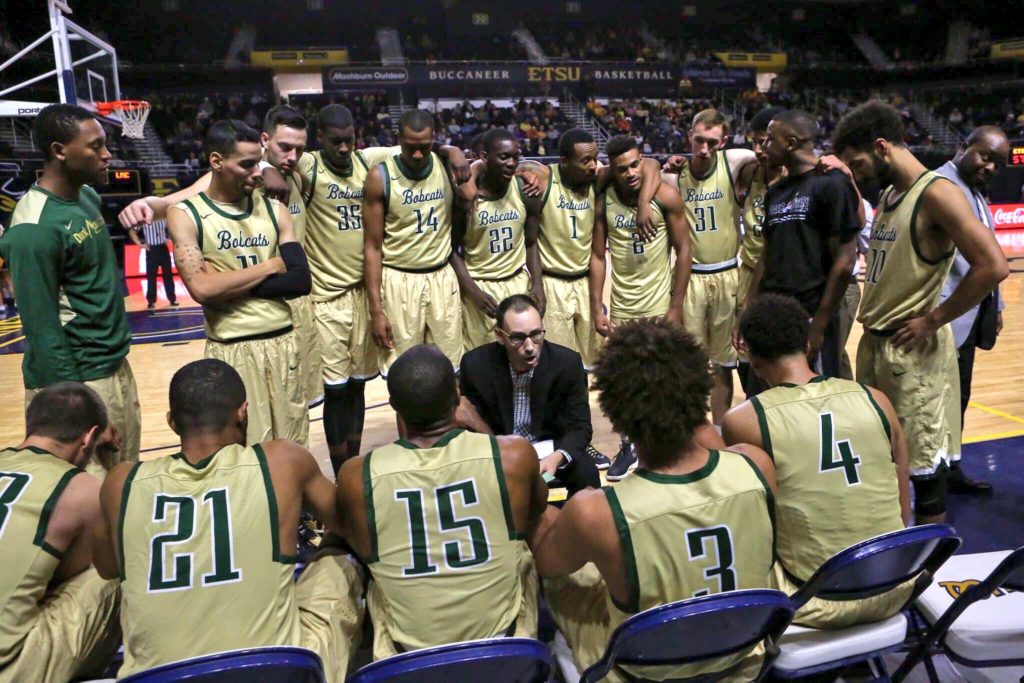
Steve Hardin contributed to this portion of the article.
As a head basketball coach, you always want to learn and improve. You should never get to a point in your career or even life in general where you think you know it all. As an assistant coach, your job has many roles, but one of the main ones is consistently adding value to what you offer the head coach. This basketball coaching article will give five ways to improve as a head coach and five ways to increase your value as an assistant coach.
5 Ways to Improve as a Head Basketball Coach
Servant Leadership
“Success is never owned. It is rented, and the rent is due every day.” Your basketball players and staff must know that you will do whatever it takes to be successful. Also, they must see you putting in the time and know you care!
Simplicity with Continuous Repetition
Know your basketball program’s philosophy and stick to it. You can know everything about basketball, but if you cannot teach it to your players, your knowledge becomes worthless. Repetition makes sure your basketball players and staff understand every detail about the program and what you want from them. When there are clear expectations, it is easy for coaches and players to achieve what you require from them.
Understand the Basketball Team
Every basketball team is different. Communicating with each member and making sure every player is on the same page is vital. This will create a bond that will be bigger than just basketball.
Empower Your Assistant Coaches
Teach, guide, and listen to your assistants. Give them a platform to help you be successful. Work together as a unit and move forward through every obstacle as one force. Spending time with them outside of the office and practice is essential. It brings the staff closer together, which is major in the eyes of the players. As a head coach, you also should help your assistants get to the next step in their career. Empower your assistants and give them opportunities to succeed.
Have Substance
Always practice what you preach. I believe in being a positive light. A consistent upbeat coach will help to guide everyone in the way that they should be going. Remember, we are developing young men!
5 Ways to Add Value as an Assistant Basketball Coach
Be Ready to Work Every Day
I mentioned earlier that success is not owned. This means that you need to have the mindset of outworking everyone in your profession. If we want our basketball players to outwork everyone, we must be willing to do the same! Time is our most precious value – be the first one in, and the last one out of the office.
Be Loyal
Understand how the head coach works. Teach his way with the same verbal cues. You can be the sounding board for the players, but you must always protect the program by protecting the head coach.
Understand Your Role
Know precisely what your role is from the head coach and execute it to perfection. Listen and understand the head coach’s plan and what each player’s role is for the team. This will allow you to clearly communicate with players what is needed of them by the head coach. As an assistant basketball coach, you need to be an all-star in your role.
Be a Student of the Game of Basketball
Listen and learn the game and the head coach’s philosophy in all aspects of the program. You must be in tune with the player’s needs. Keep detailed notes on everything. Study how the head coach handles every situation, good and bad. Go to basketball coaching clinics, go to other team practices, build relationships with other coaches across the country. This has become much easier with social media. Read leadership books, coaching articles, and other educational pieces to help keep your mind fresh.
Make the Head Coach’s Job Easier
Take pride in being an assistant basketball coach and doing all the small things exceptionally well. Even though you strive to “move up” in the coaching ranks, make the current job your total focus and do that to perfection. You are a valued member of the program and treat your job that way. Take anything and everything off the head coach’s plate that you can do so he/she can focus on being the head coach.
Improving and Adding Value as a Basketball Coach Conclusion
The best basketball teams and programs are filled with people who know their roles and can execute them at a high-level. So whether you are a head coach or an assistant coach, it is up to you to buy into your role and do whatever is needed to help the team be successful. Start by using these five keys for both assistants and head coaches, but build on them and fine-tune them to what is going to allow you to be your best. Good luck with your coaching pursuits and journey!
10 Ways to be an Asset as an Assistant Basketball Coach
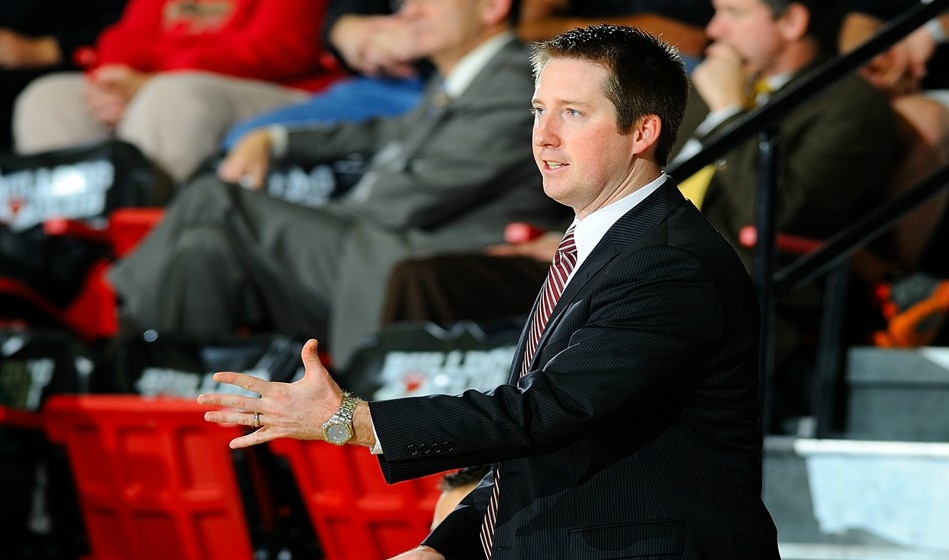
Jay McAuley contributed to this portion of the article.
Coaching college basketball for a living is a dream for many and a reality for a few. Fortunately, I have lived that dream as a Division I assistant basketball coach under some of the best coaches in the business.
Ultimately, all assistant basketball coaches strive to one day sit in the “Head Chair,” but in the meantime, our job as assistants is to ensure our boss’ success (while seeing how it is done along the way).
No two head basketball coaches are the same. I have worked for both established head coaches and leaders at the very beginning of their head coaching journey. Though each man differs in philosophy and personality, the coaches I have had the pleasure of working for all had a common drive and competitiveness about them that permeated the staff and locker room. Below are the top 10 lessons I have learned during my journey as an assistant basketball coach:
No Job is Too Small
If you are in this business, you very likely started at the bottom and have had a few job descriptions that you did not think were a part of the gig when you were dreaming of your days as a Division 1 basketball coach. The saying “someone’s gotta do it” rings especially true in this business. So be the guy that will tackle anything.
Willingness to do the less than glamorous jobs and take things off the head coach’s plate will gain you trust and loyalty in your boss’s eyes. Some leaders struggle to delegate, and others excel in this area. No matter who you work for, if you have a “no job is too small” mentality, you will not only gain in favor with your boss, but your other staff members will appreciate your extra effort as well.
Shut Up and Listen
Chances are that we have all been humbled a time or two in this profession, and those that learn to listen, tend to grow more. With each new job I have taken, I have tried to spend the first several months getting a pulse of the program and the head coach’s needs.
From there, you can formulate a plan to deliver on the most critical areas: recruiting, scheduling, fundraising, academics, etc. Your boss will ask you for your opinion or input when they need it; just be prepared and organized with facts when they do ask.
Don’t be a Know it All
Keep it simple. Doing your job well is usually the best avenue to take. The times I had gotten into trouble or regretted an action or comment have been when I did not stay in my lane. We all face enticing moments that help to feed the ego; however, your boss deserves all the credit, NOT YOU! Trying to impress your boss, staff members, or another school can not only get you into hot water but can also reflect poorly on the entire basketball program.
Lastly, you want to be confident and offer new ideas but only those that are backed by facts; do not rock the boat by providing ideas or opinions just for the sake of offering them.
RECRUIT, RECRUIT, RECRUIT!
Some would argue that this is the most important quality an AC can bring to a head coach. We all have preferences in recruiting, but that is secondary to your boss’ likes/dislikes. You must find out early what your boss likes in a prospect (skill, character, academics, etc.) while also getting a feel for the areas he likes to recruit in. Know what to sell about your spot and know how to sell it well. As AC’s, we should always be finding new ways to promote our boss and his program through social media, etc.
No Stone Left Unturned
As an assistant basketball coach, some of my best moments have been when I decided to stop at one more school, make one more call, or reply to a random recruiting email. We have all had recruiting success by finding that “diamond in the rough” player no one knew about or others passed over. Assistants must dig deeper than just recruiting services and rankings.
This problem solver mentality will carry over into other areas of your job as well. Plus, going the extra mile only helps build your network, increase recruiting territories, and promote your program to an area that might not know much about your school.
Cardinal Rule: Reply to every voice mail, text, email, etc.
Inject Confidence
This is a must, especially when working for a first-time head basketball coach. We all have fears and insecurities, and they can be magnified by the pressures we face in this profession. That is why your boss needs you to help him stay the course and remain optimistic when needed. He does not need AC’s pointing out the problems of the program.
He needs problem solvers and positive sounding boards for him to be at his best. Dog days arise throughout the season and only get worse when you are not winning. During those times, speak the truth in staff meetings and be realistic about your situation (current roster, injuries, etc.). It takes time to build the right culture and win. If you show trust in your boss’ abilities at the worst of times, then he can feel more confident in holding the team to his standards.
Promote the Vision and Leadership of Your Boss
When you start from scratch at a new school, try and find creative ways to get out and speak at basketball coaching clinics or fundraising events to spread your belief in your head coach and his vision. This will not only get you great experience in front of crowds, but it also shows your boss that you have his back and believe in his abilities to get the job done. Always find ways to promote what your boss is doing in terms of recruiting, coaching, and scheduling.
Smart Scheduling
I can hear the moans while reading this one. Scheduling is time-consuming and far from easy. However, it is an excellent way for you to network and put your stamp of approval on who you think your boss should play. If you can help create a winnable schedule with numerous home games, you will be in good graces with the head coach.
The last thing you want to do is chase the money for guarantee-games, make your team travel all over the place while missing classes, or have your coach justify your poor schedule to the program’s supporters. Scheduling smart will win you games, thus making the head man very happy.
Be a Connector
Get to know everyone on campus so that you can provide the HC with names when needed. He will lean on you to put out fires when emergencies arise, so you must be prepared.
Connecting your boss with other college basketball coaches or people in your coaching circle that can offer guidance or a new idea is definitely advised. I have had guest speakers talk to our team or connected NBA guys with my boss over a meal in the past. The more you share your circle, the more he will open up his to you down the road.
Mediator Between Parents/Players and Your Boss
Assistant basketball coaches need to keep tabs on the parents and players. I realize there is a fine line here, and coaches prefer to limit this type of communication, but I think it is necessary in today’s world. As long as you echo the head coach’s vision and be truthful to the parent/player about their progress, I think it can be an extremely beneficial routine.
Parents/players’ assumptions can be dangerous if they are not well informed, and they can lead to big problems for the staff. Head basketball coaches will appreciate you keeping some of these “issues” at bay until they must step in.
The Responsibilities of a DOBO in Basketball
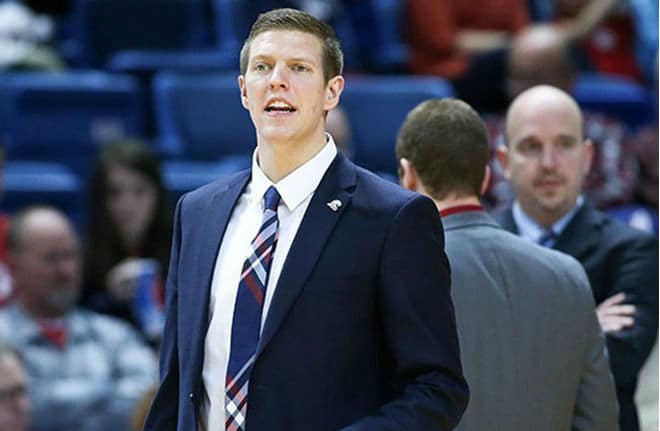
Jordan Surenkamp contributed to this portion of the article.
As a former Graduate Assistant and aspiring Head Basketball Coach later down the road, the Director of Basketball Operations (DOBO) role has made for an interesting yet necessary transition in my still youthful coaching tenure.
I would be lying if I said this type of administrative role is what I see myself doing for the rest of my life. Still, as with any CHAMPIONSHIP caliber team, players must embrace and take advantage of the role they are given and the responsibilities that come with it.
While my passion for coaching and the game of basketball can be found within the likes of running skill development sessions, helping and teaching at practice, and spending countless hours watching film, the DOBO position gives you a taste of what college basketball is about beyond the Xs and Os.
As many, if not all, of you know, as a DOBO, you are strictly placed in an administrative role, A.K.A. no running skill development workouts, no teaching at practice, no recruiting, NO COACHING at all.
Over the past three to four months, I have traded a basketball for a desk and pen, X’s and O’s for budget sheets and administrative meetings, and scouting reports for hotel contracts, game contracts, charter flight bids, and other necessary travel and program needs.
It has not been easy for me to sit at basketball practice (if I am even able to go, sometimes other things must be accomplished administratively during practice time, which does not allow me to attend) as the season has gotten underway, and not be able to coach, do or say anything. Chances are, as the season continues to move forward, it’s not going to get any easier.
However, as I said at the beginning of this basketball coaching article, being in the DOBO position is one that I see as being extremely necessary and beneficial. I was able to catch onto very quickly in my Graduate Assistant role at South Alabama because of the responsibilities that came with being a Head Coach.
Our Head Coach, Matthew Graves, does a phenomenal job on a day to day basis balancing all of the different pillars of being in that position, from recruiting to academics to balancing budgets to media relations, and anything else you could dream up, he has a hand in it, and he does it with unbelievable attention to detail.
This is where I see the importance of my role, not only in helping to alleviate some of the administrative pressure from his plate but also in embracing the ability to learn this side of running a college basketball program (which I hope to do one day as a Head Coach) and do it with similar attention to detail.
As I mentioned briefly before, my responsibilities range greatly from things such as:
- All aspects of travel (hotels, flights, charter busses).
- Game Day Operations (shoot around/practice times, officials, pre-game and post-game meals).
- Day to Day operations (facility scheduling and upkeep, all program purchases, video work).
- Gear, Housing, Budget Allocation, being an academic liaison (checking classes, weekly assignment sheets, etc.).
- Scheduling, managing both Graduate Assistants and Managers, and doing anything else I can to help our program.
The role of being a DOBO challenges you to wear many different hats daily while being able to think on your feet, adjust to changes, and handle issues as they come about. While being a basketball coach and on the floor is where I see myself in the future, it is hard not to embrace the role I have been given. The experiences I am getting from having these diverse responsibilities and the challenges of thinking critically and problem-solving on the fly will benefit me in any role I am able to secure as my career moves forward.
With all of this aside, I think it is important to recognize that, as with any basketball coaching position, it is difficult (basically impossible) to make it on your own in this career field. I would not be the coach (DOBO) or individual I am today without the help of my mentors and coaches on staff at South Alabama.
Our Assistant Basketball Coaches Russ Willemsen, Darnell Archey, Brock Morris, and Dan Matic (now at St. Johns) have given me unbelievable knowledge and advice not only now in my new role, but also as a young Graduate Assistant trying to transition from playing in college to thinking like and being the best coach I can be daily.
Lastly, I just wanted to recognize Coach Matthew Graves, who gave me the opportunity to come to South Alabama as a GA and learn from him and the culture he is instilling, even dating back to his time and great successes at Butler. I would definitely not be in the position I am today without his willingness to take a chance with me, and for all of this, I will always be truly thankful.
So every day, wake up with a passion for learning, embracing your role, and being the best you can be. Even if the role you are in isn’t where you see yourself being for the rest of your basketball career, there are ALWAYS benefits, positives, and opportunities to learn, grow, and help your program when you come to work every day to DO YOUR JOB and do it to the best of your ability!
The M.A.I.N. Things
Josh Rodenbiker contributed to this portion of the article.
Coaching basketball is a wonderful profession, but it also can be a challenging one. Getting a start in the profession is not always easy, so making a great first impression is critical. Young assistant basketball coaches are not entitled to anything and must earn it day in and day out.
I am continually learning new things and plan on continuing to do so for decades to come. I have been fortunate to work with and learn from many great people at a young age and have managed to pick up a few things that I believe can help young basketball coaches who are working to make a career in basketball. These points apply on a broader scale to assistants of all ages and in all roles.
Simply put, these are the M.A.I.N. things for young assistants to live by.
Make Your Boss’ Job Easier
In 2013, in my first meeting as a student assistant basketball coach at St. Thomas, our head coach, John Tauer, offered this advice: “If you want to be successful in this position, the most important question you can ask daily is, ‘how can I help?’” I will never forget Coach Tauer’s words, and I believe that every coaching staff member should ask that question regularly.
Our job as assistant basketball coaches is to help the head coach in whatever way we can. Frequently asking, “how can I help?” is a great start. Head coaches have many different jobs that they are responsible for, and taking just one thing off their plate each day can be very helpful. Assistant coaches ought to do a little more so that the head coach can focus on what is really important in running his/her program.
The bottom line is, be the kind of assistant basketball coach you would like to have if you were a head coach.
Add Value
What can you do to improve on something that the program already does? What can you do for the basketball program that has never been done before?
If a young assistant basketball coach is only doing the bare minimum or if he/she is not doing their work well, chances are they will not be around in coaching very long. When you are just getting your feet wet in coaching, it is of the utmost importance that you find different ways to add value to the program that you are a part of.
A great way to start is by simply asking the head coach and the other assistants what they would find helpful.
- Make a series of video edits that the head coach did not ask for but would find useful.
- Stay late after basketball practice and rebound for a player.
- Chart a specific statistic during games.
It does not have to be anything fancy or extraordinary, but the more you can add value to the basketball program, the more invaluable you become as an assistant. ADD VALUE.
Intellectual Curiosity
All great basketball coaches are perpetually curious about coaching. They seek wisdom and set out to continuously develop. Northern State legendary coach Don Meyer once said, “Get a little better every day, and you’ve got something good going on.”
Stanford psychologist Carol Dweck’s book, Mindset: The New Psychology of Success is a must-read. In it, she notes the difference between a Growth Mindset and a Fixed Mindset.
Someone with a Growth Mindset believes that ability can be developed, while a person with a Fixed Mindset believes ability is static. A person with a Growth Mindset thinks it is all about learning and lives accordingly. They embrace challenges and see the effort as the path to mastery.
One of the unique things about coaching basketball is that so many people are willing and excited to share ideas. You can take advantage of an incredible amount of resources, including but not limited to basketball clinics, blogs, websites, books, and visiting practices.
In a sense, it can be overwhelming just to think about all the knowledge out there to gather as a young basketball coach. That is also the beauty of coaching; you will always have the opportunity to learn something new.
No Task is Too Small
It is never about just you in team sports, but especially as a new assistant, you cannot bring an ego to work. You must be willing to help the group in whatever way possible.
- Get the basketballs out.
- Set the clock up.
- Clean the floor.
For me at St. Thomas, amongst other things, it means I am responsible for doing laundry for our team at Christmas time while other staffers in the athletic facility are on holiday.
You might not always like the work, but it is your job to get it done well. Like every role is vital for your players, every task the staff is responsible for is essential. Everything ought to be done with great attention to detail.
The more you can do the mundane work with a smile on your face, the more positivity you spread in the program. No task is too small!
The M.A.I.N. Things Conclusion
In living out the M.A.I.N. things, you help the program compete at a championship level, place the group above yourself, and continuously develop your skillset as a basketball coach.
Enjoy your journey in coaching!

